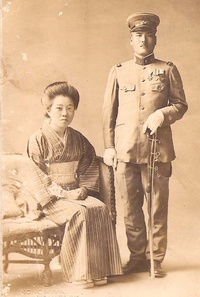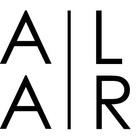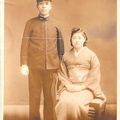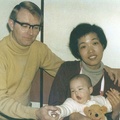Conversation with My Mother
How much fabric was left?
Not much. Boro-boro, Obaasan said. Shreds.
And your mother recognized her by the fabric
Yes.
If the fabric was in shreds, she was almost naked?
No, she wore white cotton undergarments.
And they still covered her body?
They covered her body.
They weren’t torn like her blouse and pants?
They covered her body.
What did the pattern of the fabric look like?
I don’t remember, but it couldn’t have been beautiful.
The emperor forbade decorative dress during the war.
So the pattern wasn’t pretty, not mountain peaks, or sparrows on branches?
She might have used the fabric of a finer dress to make work clothes,
like the jacket Higuchi-san made for you.
Was it plain? Was it the fabric’s texture, not pattern, that showed on her skin?
No, the fabric was patterned, and the pattern burned into her skin.
Maybe flowers?
Maybe flowers.
Maybe leaves?
Maybe leaves.
Translation

Wedding photo of my great-grandmother Kunie, great grandfather Naoyuki who fought in WWII and died in New Guinea in the Pacfic War. (Photo courtesy of author)
Some things we know: distances between cities, between Otake and Koi,
Koi and Hiroshima, names of stations, the kanji for atom reads child.
A body lying in the middle of the road, the road,
a scarf, names of lilies, golden-rayed, stargazer, demon girl, baby deer.
We know drawings, bicycles, animals on fire, a woman calling
across a rubble field, Husband forgive me for leaving,
puppets, buttons, blind fish walking in the hills,
shoes—always shoes—umbrella menders, a boy holds a bucket of sand.
Abi kyo kan no chimata Obaasan always said about that day.
There are some things I don’t know, so my mother tells me,
“No chimata means all around myself. Kyo means cry. Kan means cry.
Abi means avici, the eighth and lowest Buddhist hell of hells.”
Where there’s no light of the lighthouse that shines on the cape,
no light of a pyre, silk, mother’s eye, or freshly rinsed gauze,
but the gleam of an iron fortress, an iron rack, a place of iron birds and foxes,
where the fire dog races east to west. No time and no space,
it’s un-spaced and ceaseless: flaming serpents wrapped around a neck,
sword mountains and sword trees, thorn and razor streams,
only molten iron to drink.
***
* Poems first published in The Asian American Literary Review, Issue 1. AALR is a not-for-profit literary arts journal, a showcase of the best of today’s Asian American literature. To learn more about the journal or purchase a subscription, visit them online at www.asianamericanliteraryreview.org, or find them on Facebook.
© 2010 April Naoko Heck





